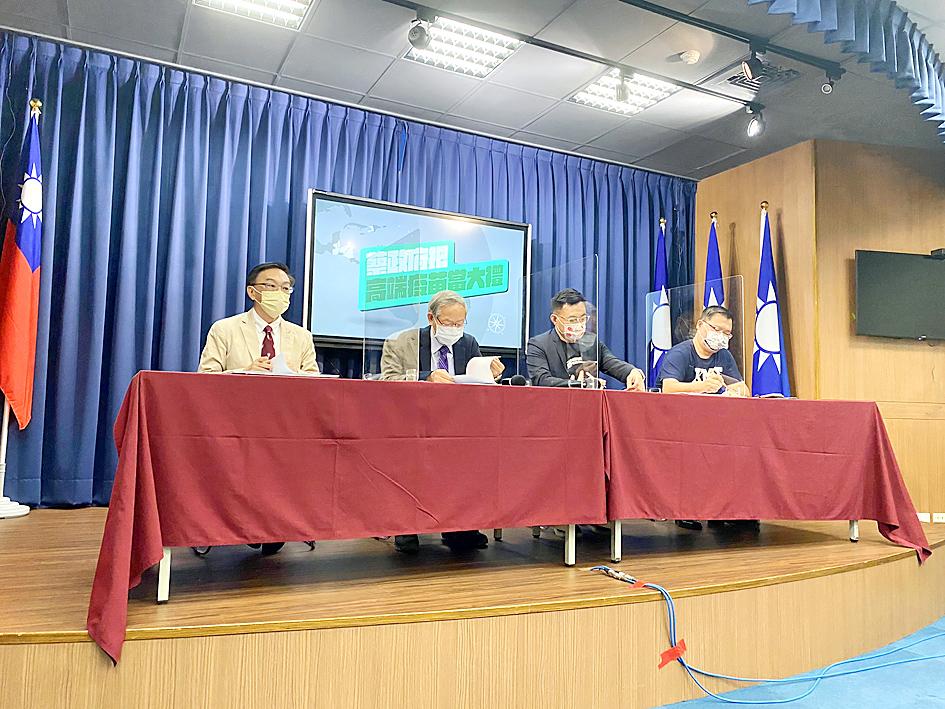The Ministry of Foreign Affairs yesterday said that its plans to donate doses of the COVID-19 vaccine developed by Medigen Vaccine Biologics Corp to the nation’s diplomatic allies are in response to their needs, after the Chinese Nationalist Party (KMT) called for an explanation.
KMT Chairman Johnny Chiang (江啟臣) at a news conference in Taipei yesterday showed reporters an image of a document that he said the ministry had sent to nine of the nation’s embassies on Tuesday last week.
The document says that the government is considering donating doses of the Medigen vaccine to the nation’s diplomatic allies and asked the embassies to inquire whether their host nations would be interested in receiving them.

Photo: CNA
“On the one hand, we rely on other nations to donate to us internationally certified vaccines, then on the other hand our government wants to use public funds to purchase domestic vaccines without international certification to give to our diplomatic allies,” Chiang said.
He questioned the “logic” behind the plan, as well as where the funding would come from.
Chiang also asked why the government was “in a hurry” to donate the vaccine, as it only received an emergency use authorization from the Food and Drug Administration on Monday last week.
The Medigen vaccine is “controversial,” Chiang said, questioning whether the donation proposal was the ministry’s idea or whether it had been requested by senior government officials.
“Taiwan’s public health standards are very high,” Chiang said, adding that the government should not sacrifice the nation’s credibility.
“The government and Ministry of Foreign Affairs must come out and explain” the plan, he said.
In a statement yesterday afternoon, the ministry said that some diplomatic allies have struggled to acquire COVID-19 vaccines and have followed the progress of Taiwan’s domestic vaccines, expressing their high expectations for them.
Beijing has continued to use vaccines in an attempt to damage relations between Taiwan and its diplomatic allies, and to protect its allies from Beijing’s “diplomatic extortion,” the government had said that it would be willing to consider the feasibility of donating domestic vaccines once they are in mass production and on the precondition that domestic demand would be met, the ministry said.
To respond to the urgent needs of the nation’s allies, the ministry asked the embassies to look into the procedures for their host governments to import foreign vaccines as part of a preliminary assessment, it said.
Any donations of COVID-19 vaccines would be funded by the ministry’s foreign aid budget, it added.

WANG RELEASED: A police investigation showed that an organized crime group allegedly taught their clients how to pretend to be sick during medical exams Actor Darren Wang (王大陸) and 11 others were released on bail yesterday, after being questioned for allegedly dodging compulsory military service or forging documents to help others avoid serving. Wang, 33, was catapulted into stardom for his role in the coming-of-age film Our Times (我的少女時代). Lately, he has been focusing on developing his entertainment career in China. The New Taipei District Prosecutors’ Office last month began investigating an organized crime group that is allegedly helping men dodge compulsory military service using falsified documents. Police in New Taipei City Yonghe Precinct at the end of last month arrested the main suspect,

A cat named Mikan (蜜柑) has brought in revenue of more than NT$10 million (US$305,390) for the Kaohsiung MRT last year. Mikan, born on April 4, 2020, was a stray cat before being adopted by personnel of Kaohsiung MRT’s Ciaotou Sugar Refinery Station. Mikan was named after a Japanese term for mandarin orange due to his color and because he looks like an orange when curled up. He was named “station master” of Ciaotou Sugar Refinery Station in September 2020, and has since become famous. With Kaohsiung MRT’s branding, along with the release of a set of cultural and creative products, station master Mikan

RISING TOURISM: A survey showed that tourist visits increased by 35 percent last year, while newly created attractions contributed almost half of the growth Changhua County’s Lukang Old Street (鹿港老街) and its surrounding historical area clinched first place among Taiwan’s most successful tourist attractions last year, while no location in eastern Taiwan achieved a spot in the top 20 list, the Tourism Administration said. The listing was created by the Tourism Administration’s Forward-looking Tourism Policy Research office. Last year, the Lukang Old Street and its surrounding area had 17.3 million visitors, more than the 16 million visitors for the Wenhua Road Night Market (文化路夜市) in Chiayi City and 14.5 million visitors at Tainan’s Anping (安平) historical area, it said. The Taipei 101 skyscraper and its environs —

Taiwan on Friday said a New Zealand hamburger restaurant has apologized for a racist remark to a Taiwanese customer after reports that it had first apologized to China sparked outrage in Taiwan. An image posted on Threads by a Taiwanese who ate at Fergburger in Queenstown showed that their receipt dated Sunday last week included the words “Ching Chang,” a racial slur. The Chinese Consulate-General in Christchurch in a statement on Thursday said it had received and accepted an apology from the restaurant over the incident. The comment triggered an online furor among Taiwanese who saw it as an insult to the